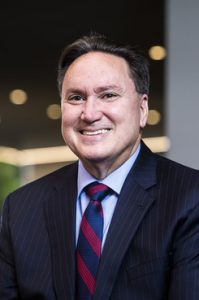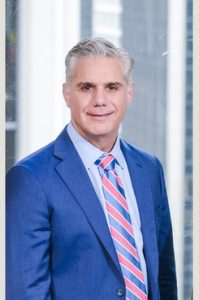2020 Vision: A Look Into What In-House Counsel Need to Know for the New Year
Corporate Counsel spoke with multiple general counsel on what they think will impact the legal industry and their work in the upcoming year.
December 27, 2019 at 01:00 AM
11 minute read

To welcome 2020, Corporate Counsel spoke to several general counsel about what they say will impact their work and the legal industry. From outside counsel merging with other law firms to the use of artificial intelligence to keep down legal department costs, these are some of the trends in-house counsel may find themselves dealing with in the new year.
Chas Rampenthal: General Counsel, LegalZoom.com Inc.
I believe that 2020 is going to be the first year we see some of the Big Four jumping into U.S. markets, like truly jumping into the U.S. legal market. It's a prediction. And those guys are typically a little bit risk-averse, so I could be jumping the gun a little.
 Chas Rampenthal.
Chas Rampenthal.But right now you have the Association of Professional Responsibility Lawyers in at least five different states talking about how they need to change the lawyer ownership rules to allow companies not owned by lawyers to start providing legal services here in the U.S. Look at Utah, where they're saying straight up if you've got a business model that you want to try in Utah you come tell us and we'll let you do it. They've talked to the LegalZooms about it. They've talked with other legal tech companies. And I can't imagine that they're not talking to the Big Four. And I think we're going to see those guys start to take a foothold in doing more U.S. work. Maybe it starts out federal or in one or two states, but after a while it's going to be hard to deny that it's here to stay.
I'm looking at this from a corporate legal department perspective. When you take a look at what the Axioms and the Elevates of the world are doing, they're doing that thing that law firms have been lax to do, which is put tons of legal operations technology and process refinement around the legal service that they're providing, which allows them to do it at such a great rate. But one of the places where they've been unable to go is providing legal services directly to a company.
The business model of law starves innovation because it starves people and money from the traditional law firm setting. These companies, they aren't starved for people or for money in the same way. It's a big if, and I have no inside knowledge, but I just get the idea that the U.S. is on the cusp of accepting some level of new business model when it comes to law. And in doing so I think it's going to unlock the potential of the corporate legal department first.
D. Cameron Findlay: General Counsel, Archer Daniels Midland Co.
One trend that I see is an acceleration of the consolidation of big law firms into mega law firms. It seems like every week one of our firms calls me and tells me that they are going to announce a merger with another firm or are considering a merger with another firm and so I don't have any statistics to back this up, but it just seems like the wave of consolidation that occurred in the early 2000s just keeps accelerating even more.
 Cameron Findlay.
Cameron Findlay.In terms of the benefits to in-house counsel, for a big multinational company like ADM, I have to admit that it's nice to know that our principal firms can handle a broader array of matters in a broad array of geographies. It is kind of nice to call up, if you have an investigation that crosses national boundaries, and say, "Can you handle it without hiring other firms in other countries?" But there are disadvantages, too. I am assuming law firms are not doing this to make less money. So they must assume that they're going to get paid more by companies like ours. And unlike when companies merge to gain cost savings, you just don't see that as much with law firms.
It does raise the possibility of conflicts. I've had at least a couple questions that have arisen this year because law firms have merged with firms with which we've had disputes in the past. And so we've had to work through those sorts of things. And I think one of the reasons firms do it is to enable their colleagues to cross-sell with existing clients at the other firm. If you're not careful it can place a burden on in-house counsel as they're asked to meet with the Dubai office or the Shanghai office or the securities law practice of the firm that your firm just merged with.
We've been able to work out those situations, but they can be kind of awkward. And in some cases you're somewhat surprised that the firm didn't figure out the issue before they did the merger. But that's just a fact of life these days.
James Chosy: Executive Vice President and General Counsel, U.S. Bancorp
Well-being is another topic that has been getting a lot of attention through the [American Bar Association] and the ABA Pledge. It's long past time since the profession paid attention to these dismal statistics.
 James L. Chosy.
James L. Chosy.We've got a committee in the works and we're sourcing some ideas from our workforce on attorney well-being. I think our biggest success has been engaging in the conversation and making it known to our people that this is an important topic for us. One of my senior leaders is acting as an executive sponsor on this, but I also think it's something that's important that I spend a lot of time on and something we're going to talk openly about.
We started a brown bag session on work-life balance generally and go over issues such as managing family and issues with childcare. People are sharing their successes and struggles. It's been terrific and was something that we didn't offer a forum to talk about as openly before. The stresses in the profession are very real and it's long past time that we've started to pay attention to them.
For us, stage two of this is to start more programs surrounding attorney well-being. We're starting to think about whether there could be a collaborative conversation with our partners on the outside. We have a very good relationship with them and I think that is a good place to have the conversation.
I think attorney well-being will be a trending issue in 2020. The ABA Pledge has not hit critical mass yet. But I think the momentum is going to build as some leading law firms and companies start to stand up. I think that is what is going to bring more attention to this issue.
Chris Young: General Counsel, Ironclad Inc.
2020 will be the year the general counsel cement their seat at the executive table. They have gone from sort of being known as the deal breaker to the dealmaker. The legal department will be data-driven as other departments are. 2019 was a banner year for general counsel investment in legal tech with a total investment this year alone of some $1.2 billion, the busiest year to date. There is a shared interest in historical data that legal has access to. They can extrapolate and hone in, keeping a finger on the pulse of the business in a way that legal teams have not been able to do in the past.
 Chris Young.
Chris Young. It is important to recognize the rise of the legal operations professional. There has never been as much attention paid to and excitement around this profession that is becoming even more mission-critical to running an efficient legal department. Hiring a legal ops professional also makes the in-house job more attractive to law firm attorneys because they can focus on substantive work.
A lot of companies in the name of culture encourage their employees to be on some kind of social media platform, with people sharing personal things about themselves and their families. I haven't heard any cases yet, but I think about what sort of issues, especially in employment matters or employment disputes, could arise.
[Related to terminations] I see increased liability, more heartache, more complications and higher costs. General counsel need a well-thought-out policy that allows their company culture to thrive but takes measures to limit the harm [of social media posts]. I'm not sure yet what that policy should look like, but it must be specifically tailored for each company.
Bill Deckelman: Executive Vice President, General Counsel and Secretary, DXC Technology
 Bill Deckelman.
Bill Deckelman. The effects of accelerating digitization and maturation of foundational AI technologies will begin to become more visible and compelling to corporate general counsel facing a risky global economy and growing pressure to reduce costs while delivering measurable value to their businesses.
Their in-house legal organizations are going to need help getting started down the digital transformation path—they cannot go it alone so they will turn to global providers who can scale technologies and business processes to quickly impact bloated cost structures and kick-start long-term transformation plans. Look for 2020 to be the year providers of enterprise legal services demonstrate traction with corporate legal buyers in this nascent but promising market. We should expect to see significant disruption in this space during the coming decade.
Eric Dinallo: Executive Vice President and General Counsel, The Guardian Life Insurance Company of America
 Eric R. Dinallo.
Eric R. Dinallo.We're preparing for even more change in our industry in the coming year. The pace of technological and regulatory change is top of mind as innovation remains a priority. All of this in the context of the current political climate virtually guarantees a highly dynamic 2020. Companies will need to be nimble and leaders will need to work more closely than ever to be effective and maintain their competitive edge.
At Guardian, legal partners with information technology to ensure regulatory compliance is integrated into our innovation efforts every step of the way. We want to leap two steps forward without being at risk of taking one step back. Agility and partnership will continue to be guiding principles.
Christoph Feddersen: Vice President and General Counsel, Collins Aerospace
 Christoph Feddersen.
Christoph Feddersen.The good thing is I don't think there's a seismic shift coming on anything. You have the political climate with the election next year and that may bring more tweets and more uncertainty for the global landscape. But for in-house people, the key issue for me is legal technology. That's what has already started over the last few years, but it will accelerate next year and in the years to come.
When I talk about technology, it's surely the advent of blockchain and the advent of AI and how we utilize it in the legal department, whether it's for document recognition, analysis and more into the drafting arena or purely administrative tasks.This will affect how we function as a legal department.
There are lots of different nuances in terms of how do you make a legal department function more efficiently with the use of technology. You can expand this to third-party management. Every big company has third parties that you have to manage for compliance reasons.
There is more intelligent software out there that helps with this. The economic growth may slow down just a tad. And if it does, you need to be able to respond quickly and efficiently and do even more with even less.
This content has been archived. It is available through our partners, LexisNexis® and Bloomberg Law.
To view this content, please continue to their sites.
Not a Lexis Subscriber?
Subscribe Now
Not a Bloomberg Law Subscriber?
Subscribe Now
NOT FOR REPRINT
© 2025 ALM Global, LLC, All Rights Reserved. Request academic re-use from www.copyright.com. All other uses, submit a request to [email protected]. For more information visit Asset & Logo Licensing.
You Might Like
View All
Google Fails to Secure Long-Term Stay of Order Requiring It to Open App Store to Rivals

'Am I Spending Time in the Right Place?' SPX Technologies CLO Cherée Johnson on Living and Leading With Intent
9 minute read
'It Was the Next Graduation': How an In-House Lawyer Became a Serial Entrepreneur
9 minute read
Renee Meisel, GC of UnitedLex, on Understanding and Growing the Business
6 minute readTrending Stories
Who Got The Work
J. Brugh Lower of Gibbons has entered an appearance for industrial equipment supplier Devco Corporation in a pending trademark infringement lawsuit. The suit, accusing the defendant of selling knock-off Graco products, was filed Dec. 18 in New Jersey District Court by Rivkin Radler on behalf of Graco Inc. and Graco Minnesota. The case, assigned to U.S. District Judge Zahid N. Quraishi, is 3:24-cv-11294, Graco Inc. et al v. Devco Corporation.
Who Got The Work
Rebecca Maller-Stein and Kent A. Yalowitz of Arnold & Porter Kaye Scholer have entered their appearances for Hanaco Venture Capital and its executives, Lior Prosor and David Frankel, in a pending securities lawsuit. The action, filed on Dec. 24 in New York Southern District Court by Zell, Aron & Co. on behalf of Goldeneye Advisors, accuses the defendants of negligently and fraudulently managing the plaintiff's $1 million investment. The case, assigned to U.S. District Judge Vernon S. Broderick, is 1:24-cv-09918, Goldeneye Advisors, LLC v. Hanaco Venture Capital, Ltd. et al.
Who Got The Work
Attorneys from A&O Shearman has stepped in as defense counsel for Toronto-Dominion Bank and other defendants in a pending securities class action. The suit, filed Dec. 11 in New York Southern District Court by Bleichmar Fonti & Auld, accuses the defendants of concealing the bank's 'pervasive' deficiencies in regards to its compliance with the Bank Secrecy Act and the quality of its anti-money laundering controls. The case, assigned to U.S. District Judge Arun Subramanian, is 1:24-cv-09445, Gonzalez v. The Toronto-Dominion Bank et al.
Who Got The Work
Crown Castle International, a Pennsylvania company providing shared communications infrastructure, has turned to Luke D. Wolf of Gordon Rees Scully Mansukhani to fend off a pending breach-of-contract lawsuit. The court action, filed Nov. 25 in Michigan Eastern District Court by Hooper Hathaway PC on behalf of The Town Residences LLC, accuses Crown Castle of failing to transfer approximately $30,000 in utility payments from T-Mobile in breach of a roof-top lease and assignment agreement. The case, assigned to U.S. District Judge Susan K. Declercq, is 2:24-cv-13131, The Town Residences LLC v. T-Mobile US, Inc. et al.
Who Got The Work
Wilfred P. Coronato and Daniel M. Schwartz of McCarter & English have stepped in as defense counsel to Electrolux Home Products Inc. in a pending product liability lawsuit. The court action, filed Nov. 26 in New York Eastern District Court by Poulos Lopiccolo PC and Nagel Rice LLP on behalf of David Stern, alleges that the defendant's refrigerators’ drawers and shelving repeatedly break and fall apart within months after purchase. The case, assigned to U.S. District Judge Joan M. Azrack, is 2:24-cv-08204, Stern v. Electrolux Home Products, Inc.
Featured Firms
Law Offices of Gary Martin Hays & Associates, P.C.
(470) 294-1674
Law Offices of Mark E. Salomone
(857) 444-6468
Smith & Hassler
(713) 739-1250






